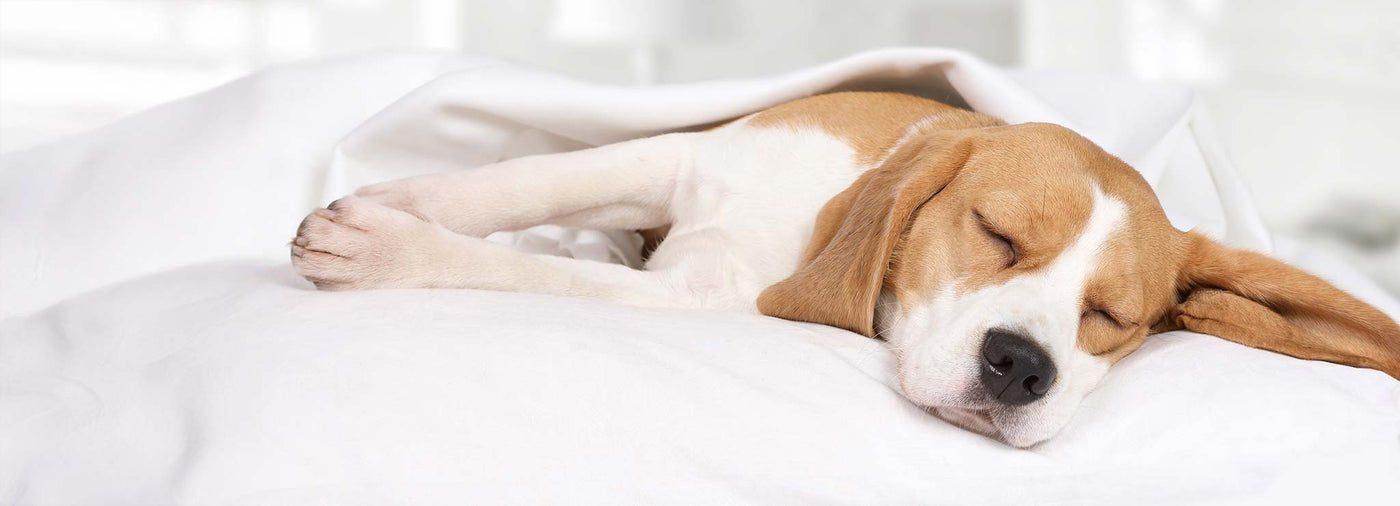Our dogs always look so sweet when they’re asleep – whether they're in a funny position or tucked into their favourite bed / blanket. As owners, we know their behaviour so well, that anything unusual can easily catch our attention. One question we’ve heard many owners ask is why do dogs shake in their sleep, particularly puppies and older dogs.
Snoozing is something most dogs love - up to 10 hours a night, plus extra zzz’s during the day mean they can be asleep for up to 14 hours. So, if your dog often shakes whilst they sleep, read on to find out “why do they do this?!”
Why do dogs shake when sleeping?
There are quite a few different reasons why your dog could be shaking.
- Dreaming
- Simple muscle twitches
- Too cold or hot
- Age
- Breed characteristics
- Underlying health factors
1. Dreaming
Though shaking can occur for a variety of reasons, dreaming is the most common cause. When asleep dogs move through different sleep stages - similar to humans. Twitching is most likely to happen during the rapid eye movement stage, which plays a very important role in processing the sniffs and adventures they've had during the day. Signs include:
- Eyelid twitches
- Jerky leg movements
- Quiet whimpers
- Twitching tails
2. Twitchy muscles
You may not even realise it, but most dogs will have twitchy muscles at some point, - especially puppies as their nervous systems are still developing. Dogs can also have sudden muscle spasms during an enjoyable sleep. Have you ever been drifting off and suddenly bolted awake? Dogs experience the same thing.
Usually, their nervous system triggers a reset as they begin to relax. So, short and subtle movements are both completely normal and harmless.
3. Temperature regulation
Dogs can't sweat like us, so they regulate body temperature differently - and sometimes this involves shaking.
When cold: Just like humans, dogs shiver to generate heat. More common in smaller breeds (Chihuahuas, Jack Russells), puppies, senior dogs, and short-haired breeds (Greyhounds, Staffies). If your dog's shaking in bed, check they're warm enough - add blankets or move their bed away from drafts.
When hot: Confusingly, dogs can also experience involuntary tremors when overheating. While panting is their main cooling method, their body may produce small shakes as it works to regulate temperature
4. Anxiety
Although most people would assume anxiety only affects your dog when they’re awake. It can cause havoc with their sleep too. Stress, anxiety and fear can drive dogs to shake and tremble while settling down for the night, or even wake themselves up with sudden jerks as they replay stressful scenarios in their dreams.
Common sleep shaking scenarios explained
Now you know the main causes, let's look at specific situations you might be experiencing.
Dog back legs shaking while lying down
Many owners specifically notice their dog's back legs shaking while lying down. This is incredibly common! Back legs do most of the power work during running and jumping, so they feature more prominently in active dreams. Dogs essentially "run" in their sleep using the same muscle patterns.
In older dogs, back leg shaking during rest (both asleep and awake) could be an early sign of muscle weakness or arthritis. If you spot this, we would always recommend a chat with your vet to be on the safe side.
For older dogs, we recommend adding a joint supplement to help keep them comfortable and active in their golden years. Our JointWell® Tablets provide daily support with Glucosamine and Chondroitin for dogs who love to stay on the move. While MoveWellia® Tablets offer award-winning, advanced joint care for those already experiencing stiffness or mobility challenges.
Why does my dog whimper and cry in their sleep?
Have you heard your dog whimper or bark in their sleep? It’s very common. Most dogs make sounds during sleep, from little whimpers, maybe tiny barks, or even a growl. If partnered with body shakes, it usually means they're having a vivid dream. Although dogs don't have the imagination humans do, their dreams can still be vivid, but will be memories of real experiences - lost toys, favourite foods or time on the sofa with you.
Why does my dog shake when breathing in while sleeping?
One reason, could be due to an existing health condition, especially if you have a Brachycephalic breed. Basically dogs with short snouts and flatter faces like French Bulldogs, Boxers & Pugs, can struggle with breathing difficulties - which then worsen when sleeping, causing vibrations every time they breathe. If this behaviour is new or you're concerned, we'd recommend recording a video of what your dog is experiencing and checking with your local vet.
Why does my puppy shake when sleeping?
Puppies are champion sleepers, and can sleep up to 20 hours a day in their first 14 weeks. Sleep is so important for their development, helping their brain process and categorise everything they’ve done, and learnt throughout the day, plus it also gives them a well needed break
But, why are they such shakers? Well, their nervous system is in its infancy, and still changing, meaning they’ve less control over twitches, shakes, and quivers when sleeping. As they process new info, they spend even longer in the Rapid Eye Movement sleep zone than older dogs, which means more dreaming, and more wriggling. All completely normal!
When to worry: If your puppy can't be woken easily, seems lethargic when awake, or puppy shaking is accompanied by vomiting or diarrhoea, get them checked by a vet.
Top puppy tip: Make sure they are warm and snuggled in, as pups lose heat faster. Keep them active so they’re tired out and ready for bed, and it's always better to start good routines early - so try setting a bedtime routine.
Why is my old dog shaking when lying down?
Like puppies we mentioned above, older dogs are also more prone to shake than their adult counterparts, but for different reasons.
- Muscle weakness: With old age natural muscle loss causes tremors, mainly in their back legs.
- Arthritis and joint pain: This can cause discomfort, making it hard to get comfortable, causing restless sleep and involuntary twitches.
- Feeling cold: Shivering when cold of their slower metabolisms and reduced muscle mass.
- Neurological changes: Some seniors develop age-related conditions causing tremors, much like humans.
When to worry: Assess your senior dog - has shaking suddenly started, is it getting worse, are they in pain, or are they also being sick? If these symptoms or any others worry you, speak to your trusted vet.
Top tips for senior dogs: Get your dog set for a comfortable sleep, investigate orthopaedic beds, keep the room nice and warm, start them on MoveWellia®, and don’t forget to book regular vet check-ups.

Health reasons why dogs might shake when sleeping
As we’ve covered most shaking scenarios are completely harmless, but sometimes it could a sign of a potential health problem. Here’s a few to watch out for while sleeping.
- Panting and shaking: Might be down to overheating, pain, or respiratory issues. Panting while sleeping isn't often seen as normal for a dog.
- Heavy / laboured breathing and shaking: Could be early signs of respiratory problems, heart conditions, or pain.
- Pain and shaking: Arthritis, injuries, dental, or other medical problems can cause pain related trembling.
- Vomiting or diarrhoea while shaking: This combinations could indicate medical problems, from poisoning to gastrointestinal infections.
If your dog is experiencing any of these, we'd recommend seeing a vet to examine your dog and diagnose the cause.
Seizures - knowing the difference
Now, while dreaming is completely normal and something many owners can recognise in their dogs, sudden or unusual behaviour can be worrying. You might find yourself wondering — is my dog just dreaming, or could it be something like a seizure?
Please note that this is just general advice giving you a few tips on what to look out for. If you are seriously concerned, always contact your vet.
Normal dreaming:
- Gentle movements, often associated with running and barking like leg or lip twitches.
- Easily woken by calling their name
- Brief (under 1 minute)
- Body stays relaxed
- Dog recognizes you when awake
When to call your vet:
- Violent, uncontrolled shaking
- Dog unresponsive while sleeping
- Prolonged (2+ minutes)
- Rigid body, excessive drooling
- Loss of bladder/bowel control
- Confused or disoriented afterward
Knowing the signs of dog seizures and how to tell if a dog is having a seizure while sleeping can be crucial. If you suspect dog fitting in sleep: Stay calm, note the time, don't restrain them, move objects away, film the episode if you can and contact your vet immediately.
Should I be worried if my dog is shaking?
In fact, in the majority of cases, there's no need to worry.
However, always visit your local vet if you are at all worried, or they show any of the below..
- Dog shaking uncontrollably or dog won't stop shaking
- My dog won't stop shaking and seems difficult to wake
- Dog constantly shaking or behaviour suddenly starts
- Dog shaking for no reason with other symptoms
- Why is my dog randomly shaking with stiffness or drooling
- Dog appears in pain - dog trembling for no reason needs investigation
- Why has my dog started shaking suddenly
How to stop my dog shaking in their sleep
Sadly, there’s no way to stop this from happening, but there are a few things you can do to help your dog feel more comfortable while they sleep. For non-medical causes, here are a few simple tips that can make a big difference:
- Comfortable bedding - Invest in quality beds - try orthopaedic mattresses for senior dogs or cosy bolsters & covered dens for anxious dogs.
- Find the perfect temperature - Keep rooms nice and cosy, not too hot but not too cold.
- The right amount of exercise for their breed - If your dog is tired, they’ll sleep deeply and fidget less. So lots of walks and fun games.
- Routines rule - Regular bedtime routines create structure and a more relaxed sleep.
- Create a safe space - For the anxious dogs who can’t settle, make a cosy den they feel safe in and consider supporting them with calming supplements. Our Scullcap & Valerian Tablets are ideal for daily use to help naturally reduce anxiety over time, while our Valerian Compound offers fast-acting support for sudden stresses, such as loud noises, new home or changes in routine.
Advice from Dorwest
We'd just like to reassure you that sleep-shaking is very common and usually nothing to stress about.
For most dogs, it's simply dreaming, part of the REM sleep cycle or natural muscle twitches. Puppies and seniors do shake more, but for opposite reasons. Puppies' nervous systems are developing, and older dogs suffer more from the cold, muscle weakness, and arthritis.
Whether or not veterinary treatment is needed isn’t always 100% obvious, so be aware of the severity of the shakes, duration and whether they are paired with other symptoms. If concerned, a vet visit is always wise.
If you have any questions or need any help choosing which product is best for your pet's health - feel free to reach out and contact us our expert and friendly team on 01308 897272 or email info@dorwest.com.
For more top tips and behind-the-scenes updates, follow us on Facebook, Instagram or TikTok!




























